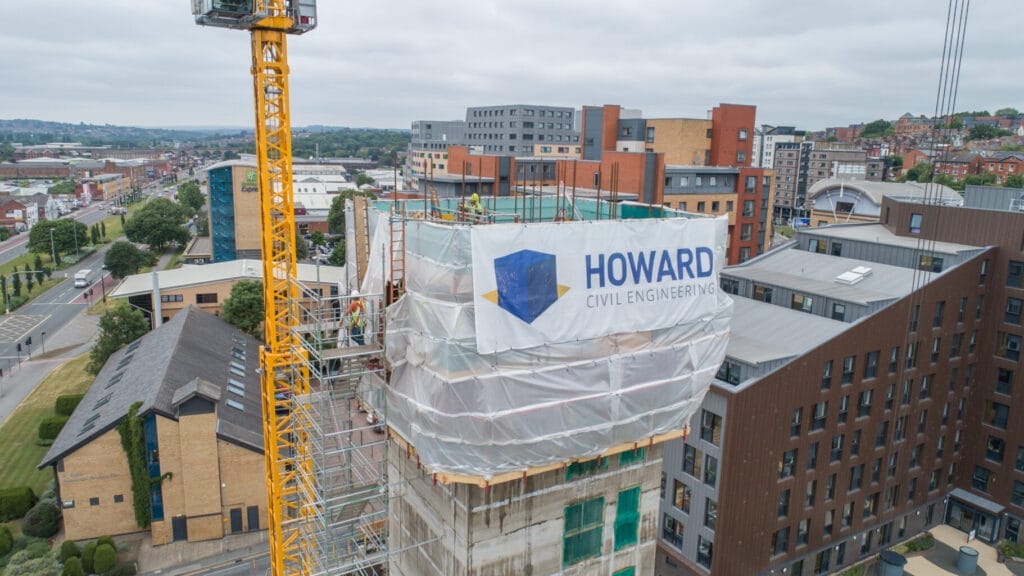Sustainability manager Sophie Henderson has been a member of the Howard Civil Engineering team for eight years, so she’s no stranger to the stigma which surrounds mental health in the construction industry.
We sat down with Sophie to discuss her own experiences of poor mental wellbeing, how motherhood has affected her, and why it’s so crucial to keep the topic of mental health going on sites.
Why did you become a Mental Health First Aider?
I have been in the construction industry pretty much since I left school and having worked for a while on-site, I’ve seen first-hand the primarily negative attitudes that can unfortunately prevail around discussions of mental wellbeing.
I also have a relative who has suffered with poor mental health, and I’ve seen the knock-on effect it has for their family members. It can be quite scary, saddening, and hard to handle – especially when you can see a change in someone but you’re not sure why. Once you know a little bit more about it, it becomes more apparent. I just thought that if a Mental Health First Aid course would make me more equipped and have more knowledge around it, I can help more people.
Construction is predominantly male, and it can be quite laddish with a ‘just get on with it’ attitude. I think having someone to speak to or someone that you can confide in in the workplace makes it a bit better; you feel more included.
As a woman, I also think I’m in a unique position to help my male colleagues who may be struggling with poor mental health and feel they may be judged by discussing these concerns with their male peers. Even if talking to a female MHFA is just the first hurdle, men might then feel more comfortable opening up to other men.
How do you recognise the signs of poor mental wellbeing?
In my experience, my relative became quite withdrawn from everything, not wanting to engage in conversation and wanting to be left on their own. It was hard to speak to them. It became quite scary and progressed into hallucinations, which is when I realised it was beyond my help.
At the time I didn’t know where to point them, so I’m glad my MHFA qualification has given me the knowledge of professional places I can point people to if they need help, whether this is speaking directly with their GP, helpful websites such as Lighthouse, and even text messaging services people can use if they don’t feel up to having a verbal conversation.
Have you had your own struggles with poor mental health?
After I had George, my son, I wasn’t really myself for a while. I was kept in hospital for my own health after quite a traumatic birth, and it was actually really hard. People would say, ‘At least the baby is okay – that’s the most important thing.’ It kind of pushed aside how I was feeling and made me feel a bit worse because I thought, ‘Of course I’m glad the baby is okay but in myself, I am not okay.’ I’m glad I was able to open up to my partner and my friends – they were all really supportive.
I always tried to be kind to everyone before I faced my own struggles, but I’ve become an even stronger believer in kindness ever since. You never know what’s happening to at home or if someone’s had a bad morning or a bad night. I think everyone should just try and be a bit more understanding towards one another.
How do you manage your own mental wellbeing?
Alone time helps me relax. I’ll usually just go for a walk and recently I’ve spent a lot of time with my baby, but even then, sometimes you just need a little bit of a break.
You may feel a little bit bad or selfish just doing something purely for yourself, whether it’s listening to a little bit of music, talking to friends or going out for food, but at the end of it you’ll be better equipped to deal with the pressures you’re facing.
I’m also back at the gym now so that makes me feel amazing!
Why is it important for people in construction to look after their mental wellbeing?
The construction industry has the highest rate of suicide in comparison to all others, so it’s doubly important for people to be aware of the signs of poor mental health and engage in positive discussions surrounding it. It’s crucial that everyone knows where they can find help if they need to – there are people you can talk to.







